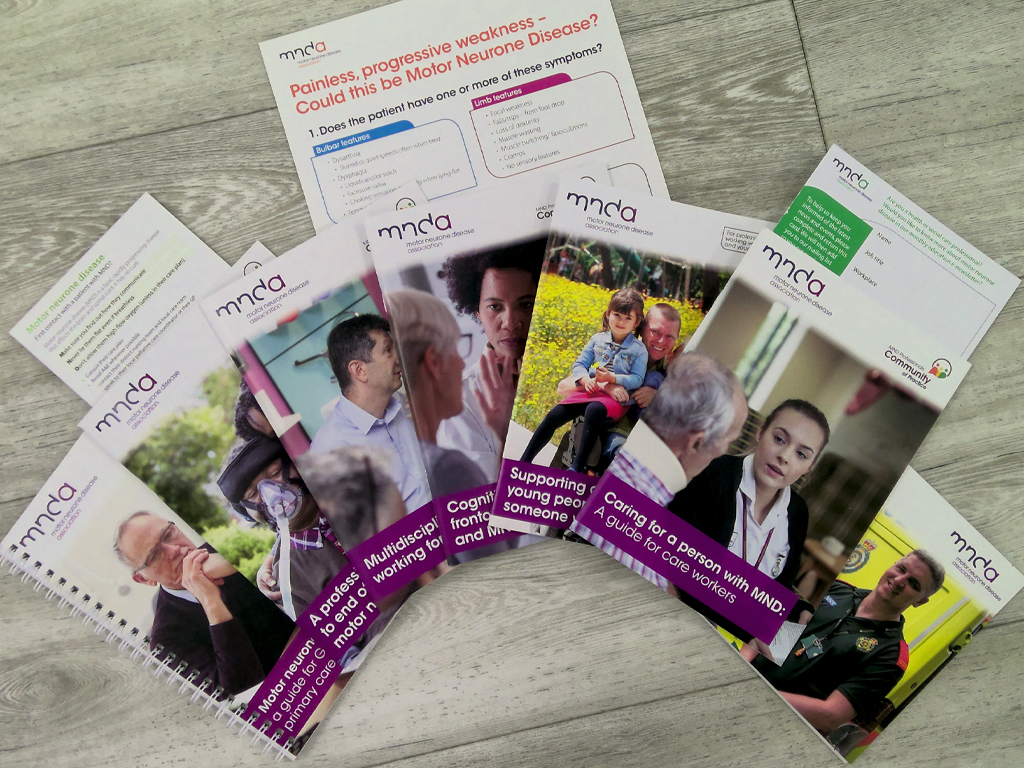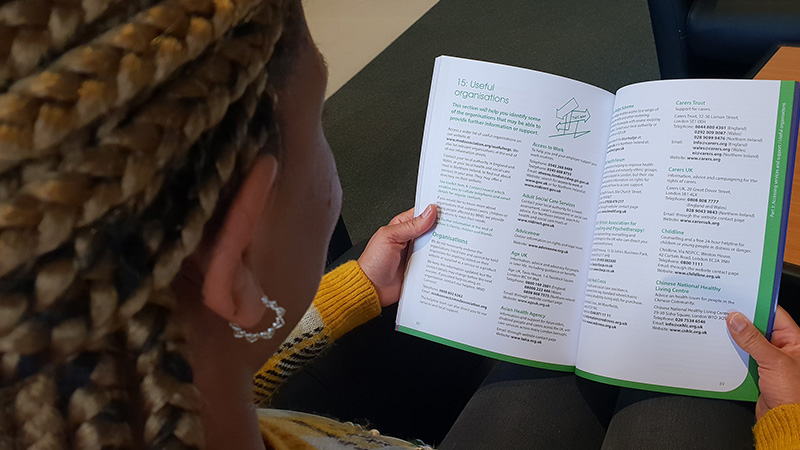
This information is for health and social care professionals.
All publications are evidence-based and reviewed by clinicians. They are regularly revised and correct at time of print. We also have a wide range of publications for people with or affected by MND.
The items below can also be ordered in hard copy from MND Connect. Email [email protected] or call 0808 802 6262.
Looking for all our resources for a specific profession or topic, for you and the people you support?
Use our Professional Information Finder
Booklets
MND Association support for health and social care professionals
Details of the support we can provide to health and social care professionals.
Motor neurone disease - a guide for GPs and primary care teams
Endorsed by the Royal College of General Practitioners (RCGP), this publication aims to help health and social care professionals provide care and support to people with MND. It includes information about symptoms, aetiology and treatment.
Occupational therapy for motor neurone disease
This comprehensive guide provides information about MND and how to support people to adapt to their changing symptoms and achieve the best possible quality of life. Endorsed by the Royal College of Occupational Therapists.
MND in acute and emergency care
A succinct guide for emergency care professionals, including ambulance staff, on actions to take and things to consider when treating a person with MND.
Cognitive change, frontotemporal dementia and MND
This booklet contains information on cognitive and behavioural change and dementia, and practical tips on management.
Caring for a person with motor neurone disease: a guide for care workers
This booklet is designed to give paid care workers information and practical tips on the care of someone with MND.
Supporting children and young people close to someone with MND
This booklet is for any professional working with children or young people who have a parent, guardian, grandparent or close relative with MND. This includes teachers, school nurses, youth workers and social workers.
A professional's guide to end of life care in MND
A booklet to help health and social care professionals to support people affected by MND with end of life concerns.
Multidisciplinary team working for MND
A guide to help health and social care professionals establish, develop and maintain an effective multidisciplinary team.
MND: A Guide For Social Care Services
A booklet to help social care professionals, including social workers, to offer the best possible support to people with MND, their carers and family.
Communication, Speech And Language Support
Information on speech and language problems in MND, and the support available.
Advance care planning for MND
This booklet includes information and practical strategies to support professionals to effectively facilitate advance care planning for people with MND.
An introduction to Kennedy's disease
This booklet introduces health and social care professionals to Kennedy's disease, and highlights support and treatment options.
Information sheets
Head supports for people with MND
Guidance on head and neck supports for people with MND.
Wheelchairs for people with MND
Information about access to wheelchair services and the types of wheelchairs recommended for people with MND.
Managing saliva problems in MND
Strategies and treatment options for managing saliva problems experienced by people with MND.
MND Just in Case kit
This sheet explains how health professionals can use and order the MND Just in Case Kit.
Providing medical evidence for benefit applications made by people with MND
Guidance for health or social care professionals who may be asked to provide medical evidence to support a claim for disability/employment benefits made by someone with MND.
Evaluation and management of respiratory symptoms in MND
Guidance for health professionals on respiratory symptoms in relation to MND.
CHC For MND
Information to support professionals assessing people for CHC funding.
Dysphagia in MND
This information covers evaluation and management of swallowing problems.
Oral suction
Information about oral suction for secretion management.
Voice banking
Information about voice banking, message banking and voice repair.
Pain in MND
Information on pain management.
MND information for dental teams
Gives an overview of potential issues people with MND face with oral health and access to dental services, and includes suggestions to help dental professionals.
Using our care information resources
Explains how to find and order our resources, with guidance on what information to provide at diagnosis.
Information provision leaflets
We have produced a selection of flyers highlighting all of our publications on a particular topic. The titles are can be clicked to access the publication easily.
Multidisciplinary team working
Muscle weakness, equipment and adaptations
Pathways
We have developed the following pathways to support professionals working with people with MND:
We also provide a selection of pathways developed by other organisations. If you would like to submit your own guidelines to be included, please contact [email protected]
Training films
Understanding MND is an introductory video for health and social care professionals. It features four people with MND, sharing their experiences of the condition.
You can view it online, or order hard copies on DVD or USB from MND Connect on 01604 611870.
Red flag tool for diagnosis
We’ve worked with The Royal College of General Practitioners (RCGP) to create a Red Flag Tool For MND, which is designed to improve timely referrals to neurology and therefore speed up the time to accurate diagnosis.
Just in Case Kit
The MND Just in Case kit is designed to hold medication that may be needed if a person with MND experiences a sudden change in their symptoms, such as breathlessness, coughing or choking. It is ordered by a GP for a named patient.
Allied Health Professionals' Competency Framework
Allied Health Professionals’ competency framework for progressive neurological conditions
Covering the responsibilities of allied health professionals working with patients with progressive neurological conditions. With sections that focus specifically on Parkinson’s disease, multiple sclerosis and motor neurone disease.
Universal Principles for Advance Care Planning
The Universal Principles for Advance Care Planning has been jointly published by a coalition of 28 partner organisations, in response to the Care Quality Commission report ‘Protect, Connect, Respect – decisions about living and dying well’ (2021). The aim was that a consistent approach would enable people, their families and/or representatives, clinicians, professionals and workers to share the same understanding and expectations of advance care planning.

